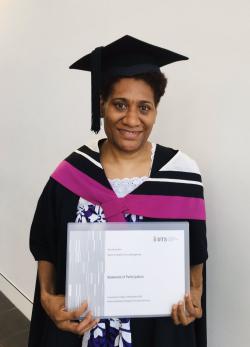The WHO CC UTS acknowledges use of key language from The WHO Global Strategic Directions for Nursing and Midwifery (2021–2025).
NCDs - in particular diabetes, cardiovascular disease, cancer and respiratory diseases – are the leading cause of disability in Vanuatu and responsible for 70% of all deaths [1]. Ni-Vanuatus are not well-informed about the risk factors and debilitating complications that NCDs can cause, nor how these diseases are preventable through lifestyle, diet and exercise changes [1]. In the last few years innovative campaigns have emerged such as the Wake Up! Project designed to engage youth through the use of dynamic communication strategies which emphasise the importance of preventing NCDs [2].
Preventing NCDs is something that is close to nursing entrepreneur, Harriet Rini’s heart. After witnessing many amputations in a hospital system struggling to deal with the growing burden of often-preventable NCDs, she and her husband (Wenly Sam, a full-time Nurse Practitioner) were inspired to set up a private health clinic in a suburb of Port Vila. Established in 2015, the clinic was originally called Omega, after the Book of Revelations’ reference to God being, ‘the beginning and end of all things’. One of her mentors, Vanuatu-based Australian, Jane Laycock, has been a faithful supporter and her ‘guardian angel’ who provided the business license for Omega.
In the public health system, Harriet explains, there is rarely an opportunity for nurses to spend quality time with each patient, to listen to their story and establish a mutual relationship. At Omega, Harriet explains, that is exactly what they aimed to do. Broadening the idea of quality health care means focusing on the whole person and in that process, providing information around prevention, rather than just treating a disease once it has progressed.
Our aim was to bring the services down to the doorsteps of our people. So for us, we felt that and we still feel that we've given a valuable contribution back to our community. Making it accessible and affordable and being located right there in the community. The key to the service is also trust.

Harriet’s big plan for the future is to find a way to integrate agriculture with health which would help her country develop towards the sustainable development goals and be an important health prevention measure. She thinks that if people have a purpose then this will impact on their health. Given that agriculture is the main source of income for most people, Harriet has an idea about teaching people to grow their own food and perhaps being able to use coconuts, one of her country’s key exports, to provide incomes for people. A vast proportion of the food in Vanuatu is imported from Australia and New Zealand and for many people fresh fruit and vegetables just aren’t accessible because they’re so expensive and not easy to get hold of. If they’re growing their own fresh vegetables then that will provide the motivation for living and also radically change their diet which will then have an impact on the country’s NCDs.
Part of the vision for Omega was eventually handing it back to the community to take ownership. Now called Laknaporo, the clinic has been spearheaded by a newly elected health committee in 2019 which consists of people living in the local community. This aligns well with Primary Health Care as the cornerstone of the Vanuatu Healthcare System as well as the Vanuatu Decentralisation Act [1].
In January 2019, Harriet was also one of 35 successful Australian Awardees chosen for the Department of Foreign Affairs funded, Women’s Leadership Initiative (WLI) training. Chosen for their potential to become women leaders, the WLI program aimed at building participant’s capability to exercise developmental leadership, institute change in their own countries and, in the long term, contribute to sustainable development outcomes for the Pacific. This also allowed an opportunity to expand their networks in the Pacific region including Australia as each participant has an Australian Mentor working alongside them.
Harriet’s passion for inspiring change is palpable when she says,
If you’re going to be a role model for other people, then you’ve got to live it. You can’t just sit there and tell people what to do.
- WHO Western Pacific Region, Vanuatu: NCD Risk Factors’ Steps Report. 2013.
- WakeUp! Project. 2019; Available from: https://www.youtube.com/watch?v=Q6L1UleJPEo

